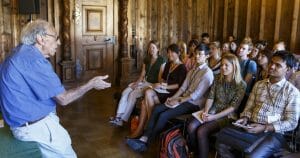A biochemist, Fischer remembered one day when he called his secretary at 5:00 a.m. to tell her that “Something happened that’s going to cause you lots of work.” Carmen Westwater sighed, “Don’t tell me, I know. You lost all your plane tickets. Again.” No, that wasn’t it: he and his University of Washington Colleague, Dr. Edwin Krebs, had just won the 1992 Nobel Prize in Physiology or Medicine for their work. Their research had been funded by the Muscular Dystrophy Association through the annual telethon hosted by Jerry Lewis. The MDA asked the scientists to appear to thank the TV stations who ran the telethon to make it clear how important it was to do that — and provided a script for them to follow. They appeared, but refused to follow the script, which was “about how we’d been striving for the prize — which of course we hadn’t ever done,” he said. “If you get a gold medal in the Olympics, you know why. You came out first. In science, it’s so different: You do your thing, working without thinking about this or any other award. Then all of the sudden in the middle of the night you get a call.”

Their work was on protein phosphorylation, which acts as a switch to activate proteins and regulate various cellular processes, including regulating how cells divide, grow, differentiate, and die. The question they wanted to answer: how do muscles get the energy to contract? What they found is the fundamental key for how cells communicate with other cells. When they published their work in 1955, it wasn’t clear how important it was. But by the 1970s, it was obvious the process is critical, leading to thousands of other research studies. “This is how hormones work,” Fischer said. “It’s how a cell grows, how a cell differentiates, how a cell dies, how cancer proceeds and so forth.”

“It’s hard to imagine how someone could have a bigger impact in the life sciences,” said University of Washington’s Biochemistry chair, Dr. Trisha Davis. It explains the release of hormones, the conversion of stored glycogen to glucose, and led to the development of a variety of drugs. “Before you can cure a disease,” Fischer said, “you have to understand the mechanism of the disease. “My advice to young students,” he told an interviewer in 2009, “would be to choose a significant problem, one that fascinates you, that excites your curiosity. Don’t get discouraged by failures. In fact, experimental results which are contrary to one’s predictions are often the most interesting. They tell us that something different, something novel, is going on.” While he retired in 1990, Fischer continued to go to seminars at the University of Washington until Covid hit. Krebs died in 2009. Dr. Edmond Henri Fischer, who asked others to call him Eddy, died in Seattle on August 27. He was 101.
